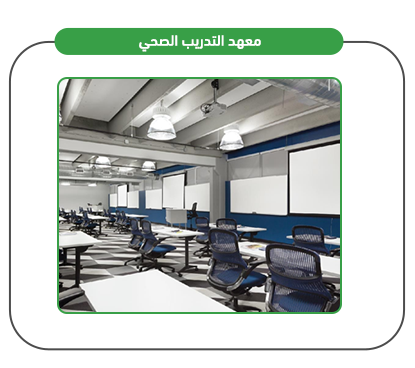A healthcare training institute is considered a pioneering institution in preparing various medical professionals, as it offers comprehensive programs that combine both theoretical and practical aspects with the aim of developing trainees’ skills holistically. The institute relies on the latest educational technologies and training methods, which contribute to enhancing students’ capabilities and preparing them to face the growing challenges in the healthcare sector. Additionally, the institute provides trainees with hands-on training opportunities in accredited healthcare institutions, giving them the chance to apply their knowledge in real-world settings and gain field experience that boosts their chances of success and excellence in their field. The institute is staffed by a distinguished group of experts and professionals who offer a rich learning experience, thereby enhancing the quality of education and building a strong foundation for healthcare practices. Through an innovative and supportive educational environment, the healthcare training institute empowers individuals to advance their career paths, which positively impacts the quality of healthcare services. Based on the above, the institute serves as an effective link between academic education and the demands of the labor market.

In a world striving for integrated healthcare, the Health Training Institute stands as a beacon of knowledge and excellence. It transcends its mere educational background to become an incubator for ambitious dreams and a creator of qualified healthcare professionals for future generations. The institute offers comprehensive training programs covering diverse fields such as nursing, pharmacy, and first aid. These programs are carefully designed to meet the needs of the growing labor market, providing students with the skills and knowledge necessary to succeed in their careers. The Health Training Institute provides an advanced learning environment featuring a modern lecture hall and laboratories equipped with the latest technology, allowing students the opportunity to apply their theoretical learning in real-world situations. The institute is committed to supporting healthcare workers by offering continuous development programs that contribute to raising their competencies and maintaining the quality of healthcare services. Therefore, if you aspire to a promising career in healthcare, the Health Training Institute is the ideal destination to achieve your academic and professional ambitions.



Providing practical training in real-life settings
Accredited certifications that increase employment opportunities
Developing specialized medical skills
Qualifying healthcare personnel to meet labor market needs
Experienced and qualified trainers
Continuously updating curricula based on the latest medical technologies
Training opportunities and practical application in hospitals and healthcare facilities
Executive summary
Study project services/products
Market Size Analysis
Risk Assessment
Technical study
Financial study
Organizational and administrative study

The Education Sector in GCC Countries
Because “Mashroo3k” Economic Consulting and Market Research Company believes in the importance of the education sector and its role in localizing national labor, it presents below the key indicators of the educational sector in GCC countries, thereby encouraging investment in this vital sector:
The total number of students in the Early Childhood Development stage (including nurseries and kindergartens) in GCC countries, according to the latest available statistics, reached 851.5 thousand students.
The number of school education students in the GCC was estimated at 9.3 million students (79.4% in the public sector and 20.6% in the private sector).
The number of adult education center learners was estimated at 181,247 students.
The number of higher education students was 2,206,446 students.
The number of early childhood education teachers was 50,647 teachers.
The number of school education teachers was estimated at 727,904 teachers.
There are 5,806 educational institutions operating at the early childhood stage.
There are 32,310 educational institutions operating at the school education stage.
Over the past years, governments in GCC countries have sought to bridge the gap between education and the labor market. They have adopted curricula that increase the share of vocational and technical education and encourage learning through modern media and technologies. It is also worth noting the increase in government spending by these six countries on education and its quality to graduate generations that meet the private sector’s labor needs.
According to the latest statistics:
Saudi Arabia spends 18.9% of its budget on education.
The UAE spends 14.8%.
Oman spends 12.2%.
Bahrain spends 9.8%.
Kuwait spends 12.3%.
Qatar spends 10.5% of its budget on education.
By the year 2023, the value of the private education market in GCC countries is expected to reach $26.2 billion.
The Global Education Sector:
The size of the global educational services market reached approximately $2,882.52 billion by the end of 2021, and global experts expect it to reach $3,191.79 billion by the end of 2022 — achieving a compound annual growth rate (CAGR) of 10.7%.
By 2026, the market value is projected to increase to $4,623.90 billion, achieving a CAGR of 9.7% over the forecast period.

By 2030, the global value of education as an industry is expected to reach $10 trillion USD.
By 2024, the global online education market is projected to reach $247.46 billion USD.
The AI-powered education market is expected to expand at a compound annual growth rate (CAGR) of 36% from 2022 to 2030.
In the year 2000, the number of pupils worldwide was approximately 657 million, and this number increased to 739 million by 2019.
In 2000, the number of secondary education students was around 452 million, rising to 601 million by 2019.